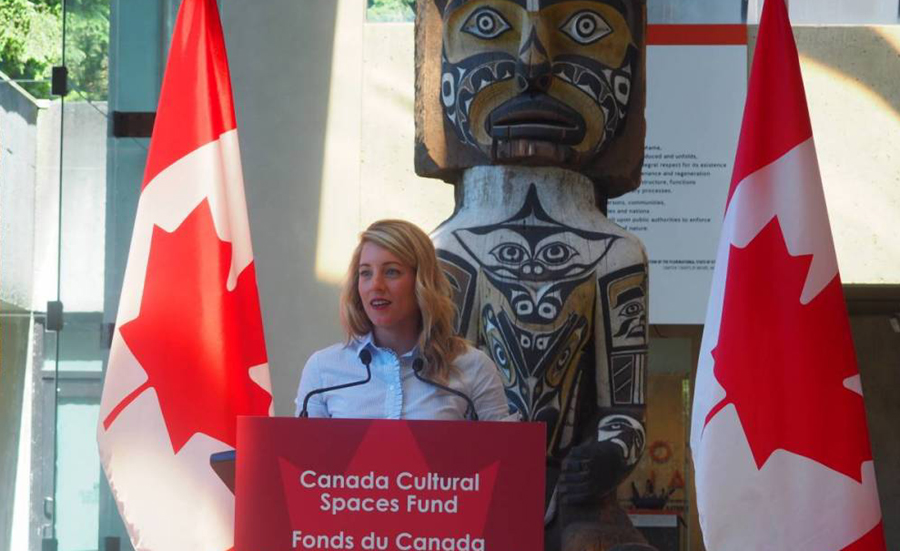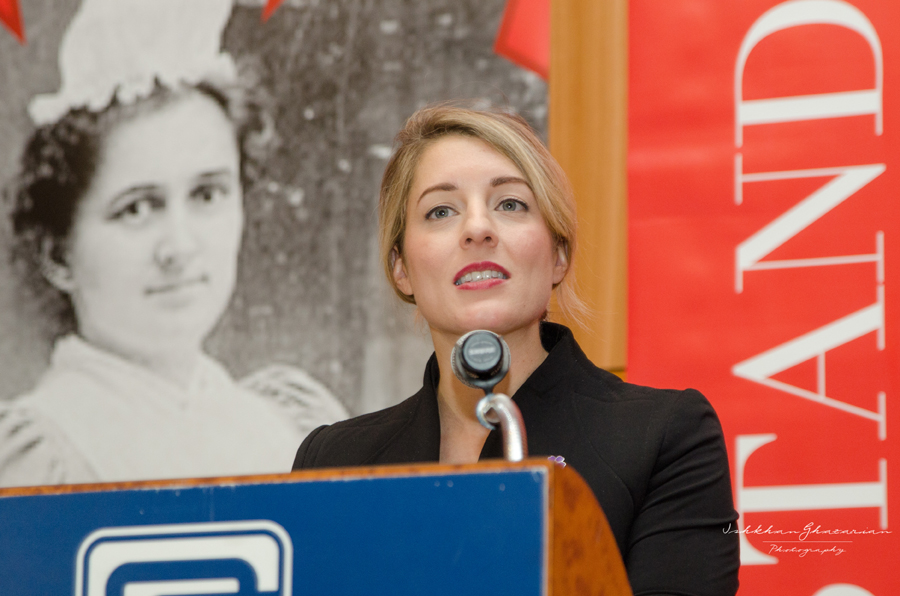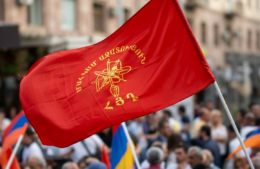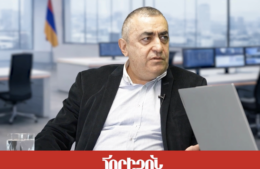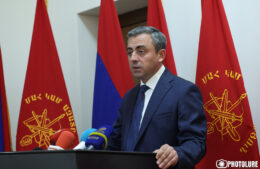Horizon Weekly’s interview with the Honourable Mélanie Joly – “What we have in mind is strengthening Canadian-Armenian trade ties”
- (0)

Mélanie Joly is a Liberal member of the House of Commons of Canada, representing Ahuntsic-Cartierville, and also serves as the Minister of Canadian Heritage.
Horizon Weekly visited her for an exclusive interview at her constituency office.
- By: Diana Skaya
HW: –You oversee Official Languages and Multiculturalism, among many other things. What does a typical day for Mélanie Joly look like?
MJ: -It really depends whether I’m in the riding, in Montreal or in Ottawa. Usually, I’m in Ottawa 4 days a week. My day starts at 8 o’clock in the morning and ends at 10 pm. It involves a lot of meetings with my team, collegues and ministers.
I’m in charge of everything that involves the Official Languages and the media sector. I’m working on Indigenous languages and diversity, as well as everything related to multiculturalism. There haven’t been any investments in Official Languages in 12 years. It’s been stagnating, so I’m looking forward to making changes.
In the riding it’s different. I have the chance to be on the ground, to meet people in their houses or in my office.
I am also putting a lot of effort in revitalizing the Chabanel district.
A new post office was implemented, which is the hub for online e-commerce. There are 300 new jobs that have now been created in Chabanel.
My job requires making life-changing decisions that are extremely complex to navigate, such as immigration cases. It is about building relationships and trust, listening a lot, understanding complex issues and summarizing them very quickly in order to take the right decisions -that will have an impact on millions of people.
HW: -Speaking of media, what is your approach on equalizing English and French language content, especially in western Canada?
MJ: -We know that francophones outside Quebec are struggling and the rate of assimilation is high. The CBC/Radio-Canada plays a fundamental role in supporting the vitality of these communities. Within the next few weeks, I will be coming up with a new “Official Languages” plan and the idea is to really support the vitality of francophone communities and to increase bilingualism.
Bilingualism is only increasing in Quebec and not really in the rest of the country. What we are doing for anglophones, is looking into supporting more English-speaking communities that are outside of Montreal, in the rural areas.
HW: – Talk to us about your philanthropic work.
MJ:- I’ve been involved in a lot of philanthropy over the years.
As a Minister, I’m not involved as much due to conflict of interest, but I am always very keen on supporting the arts sector. It really is my passion.
I am a contemporary art collector. I love investing in the young generation. Ever since I was 30 years old, I told myself that every year I would buy myself an important art piece from a living artist. Some years I’ve been buying more. The year of my election, I bought three. I’m always going to art fairs. I’ve made some great choices on my collection and some of them have taken some interesting value.
HW: – Tell us about the most inspirational person that you have met throughout your career and why?
MJ:- I’m moved by people in general. I’m on a mission to change the system for the better, for the people. I’ve known that since I was a little girl. My parents, my teachers and the people that I’ve worked with were all great mentors. I’m very cognicient that there aren’t a lot of young women in politics. Therefore, I am now developing a new leadership model with several collegues. For a long time, femininity and politics was not something that was an easy cocktail. If you were a woman in politics, you were actually trying to have a leadership that was not necessarily an authentic one. By authentic, meaning a leadership policy based on male dominated stereotypes.
I believe there is a search for authenticity and in that context, I want to be myself with my strengths and sometimes unfortunately my faults. I know that by doing so, other generations of young women will be themselves when they are in politics or in other types of leadership positions.
HW:- Bilateral relations between Armenia and Canada are characterized by high-level exchanges, close people-to-people ties and collaboration in international organizations such as “La Francophonie”. Bilateral trade has grown between the countries through agreements like the one on Trade and Commerce (1999), yet little has been done in terms of mutual cultural exchanges. What kind of cultural projects would you like to see implemented between the two countries?
MJ: – Former ambassador Armen Yeganyan and I had a very good working relationship. He really worked on having Armenia participate in the 150th anniversary of the Confederation. Exceptional Armenians contributed to the main event held in Ottawa. That was a good way to work together and to develop strong cultural ties. The reality is there are Armenians that are very present in our cultural sector, from being fantastic filmmakers to performing artists.
I am now looking forward to having great conversations with the new ambassador. We had the chance to speak to each other but I would be very interested in promoting these ties.
I was in Scarborough in December and we announced an important anti-discrimination project. We provided around $40,000 to a group to educate the population about the Armenian genocide and its impact. That is another way that the government has been supporting Armenia’s history and culture.
HW: – Armenia will host the 17th Francophonie summit this year. The Honorouable Prime Minister Justin Trudeau has confirmed his attendance which will be his first trip to Yerevan. What about yourself?
MJ: -I am looking forward to go to Armenia in the context of the Francophonie.
HW:- So you are confirming that you will go?
MJ: -I’m working on it. Following that trip, of course I hope that we will be able to strengthen the ties between both countries. It will be the first time that the Prime Minister of Canada goes to Yerevan, and I really hope that I can understand Armenia’s perspective by going there as well. It would also be my first visit.
HW:- As the representative of the Official languages of Canada and the Minister of Canadian Heritage, how do you think that this summit is important to Canadians, specifically for French Canada and the francophones in our country?
MJ: -I think that Canada has a leadership role to play in the Francophonie. Marie Claude Bibeau, the Minister in charge of the Francophonie on a much more international level, has been working very hard on this. The head of the Francophonie is a Canadian and she has been doing a good job at promoting the realities, opportunities and also the difficulties of the Francophonie, especially in Africa. That being said, we value the work of Michaëlle Jean. I think that following our new “Official Languages” plan due to come out before April 1st, we will be in a better position to talk about what our government is doing in order to support French Canada and Francophones across the country.
There are 1 million francophones outside Quebec and there are 1 million anglophones in Quebec. The challenges are different.
We are trying to tackle a difficult problem which is to change the assimilation of francophones in Canada and increase bilingualism. There are a couple of ways to do that, and that’s why the Francophonie summit will be so important.
HW: -The Armenians in Canada established an embassy 25 years ago but in Armenia there is no Canadian embassy. What does Prime Minister Trudeau’s government think about this?
MJ: In general, we have heard from the community for a need of an embassy. My colleague Chrystia Freeland is actually looking at what will be the process in different countries. Currently, no specific decision has been made. What we do have in mind is strengthening trade ties. I think that will help Armenia and it will help the Armenian population here. I have been in close contact with François Philippe Champagne who is the Minister of International Trade to see how we can actually pursue much more important trade talks between Armenia and Canada. There are very big Canadian investments in Armenia especially in the mining sector, and we are looking to see how we can further improve our ties.
